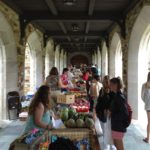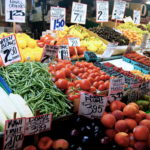This project, which is part of the larger Southern Food Heritage and Equity Initiative, provides an interdisciplinary platform to expose and address food inequality within Memphis. This research analyzes how race is a barrier to participation in farmers markets which claim to address food production, distribution and access.
Currently, Memphis is at an ironic paradox – we are the most hungry city but yet the most obese. So how does a city overcome these historical and devastating social, economic and health phenomena? Since 2008, over twenty farmers markets have emerged to provide solutions for the local food economy. These dynamic, alternative markets have been created to combat issues of food security, especially in areas deemed “food deserts” by the USDA. However, a recent preliminary study highlights how Memphis farmers markets can be defined as “white spaces” and lack racial inclusion from vendors to patrons (Kasper, Santucci, Ramsey and Hasselle 2015). This community-based project evaluates the challenges tied to these spaces and examines to what extent farmers markets reconcile issues of food security. Within this project, we collected ethnographic and spatial data from community members at Memphis farmers market. Through the creation of an integrative GIS-based network analysis of ethnographic data, we have been able to better understand how community members of color engage with the local food movement.
This project encapsulates three key areas: 1) pedagogical innovation through the formation of a collective-internship/fellowship course that brings students working in the community into the classroom for integrative learning; 2) community-integrative education through not only an integrative classroom environment but also while conducting community-based research with, for and by our community members to address a pressing social and economic issue; 3) digital innovation through the creation an interactive, digital map which includes narrative ethnographic data from community members of color participating in the local food movement. With peer mentoring and education, a “community of practice” integrated these three areas and aided in uncovering solutions for better inclusivity and beneficial community programs within farmers markets and the local food movement not just within Memphis but across the United States.
Within this project, the students oversaw the management and collected data tied to the Overton Park Community Farmers Market. The market provides a great pedagogical opportunity for students to apply their knowledge learned in many Rhodes classes to their weekly interactions with the community. In 2015-2016 (including the summer in both years), the fellows gathered data at four different markets (Botanical Gardens, Cooper Young, Downtown and Overton Park). In 2016, the fellows focused their data collection on Overton Park Community Farmers Market. We were awarded a USDA Farmers Market Promotion Grant and the outcomes tied to our programmatic activities need to be evaluated. Within these ethnographic data sets, we created a network analysis of our participant’s activities and narratives to explore the social, economic and health impacts of farmers markets within the local food movement.
Also, in the fall and spring of 2015-2016, the Food Security fellows participated in the first rendition of a new cross-listed class: Environmental Sustainability Internships (ANSO 460) and Environmental Sustainability Fellowships (ANSO 371). The fellows engaged in a participatory education experience with their fellow peers (similar to my engagement with colleagues in the Faculty Innovation Fellowship Program). The bi-weekly class sessions offered points of reflection and critical engagement as we parsed through the ethnographic and spatial data collection.
Currently, our team is working alongside other researchers, such as Twanda Wadlington at the American Heart Association, to map out our ethnographies on the foodscape in Memphis and also conduct a broad analysis of food insecurity tied to race and class across Tennessee. The GIS maps will be available for viewing in late summer/early fall of 2017. Based upon the information we collected around food access and security in Memphis, this project has spurred more community collaborations. During the 2018-2019 growing seasons, With those collaborations, during the 2018-2019 growing seasons we hope to create a neighborhood-based food access network (tied to SNAP/EBT usage) that would benefit individuals and families across the city.
This type of collaborative project is highly transformative as it pushes one beyond their academic “silos” into integrative scholarship. As a junior faculty member, this has already and will continue to occur for myself given the collaborative nature and interdisciplinary exposure to variety of food-related challenges within the Memphis foodscape. Unfortunately, before this experience, I have not had much dialogue with other colleagues about my research and current projects within the local food movement. Through this project, I was able to engage and collaborate – learning from others while they learn from me. I significantly benefited from engaging with faculty who are doing similar work in a more formalized community of practice. These interactions increased the overall productivity of this project, especially when seeking counsel about building new community partnerships.
In summary, this particular opportunity operationalizes “non-traditional” settings in order to learn, digest and critically analyze. The Mellon community provided the needed support to reach our overall objective – to reinvigorate and create a more inclusive Memphis food economy. We are not quite there yet but this project help to lay the foundation in terms of research, pedagogy and community collaborations. As we create strong ties between the college, community partners and neighborhoods, we can envision those results while promoting a more complex understanding of the Memphis foodscape.
Additional Resources
- Presentation: Promoting Social Justice and Inclusivity at Memphis Farmers Markets
- Presentation: Conservation and Transformation
- Syllabus: Environmental Sustainability Internships & Fellowships
Learn more

Kimberly Kasper
Assistant Professor of Anthropology
As an anthropological archaeologist, Dr. Kasper's research and teaching focuses on the ecological and cultural legacy of food and medicinal practices in eastern United States and southeastern Europe.


